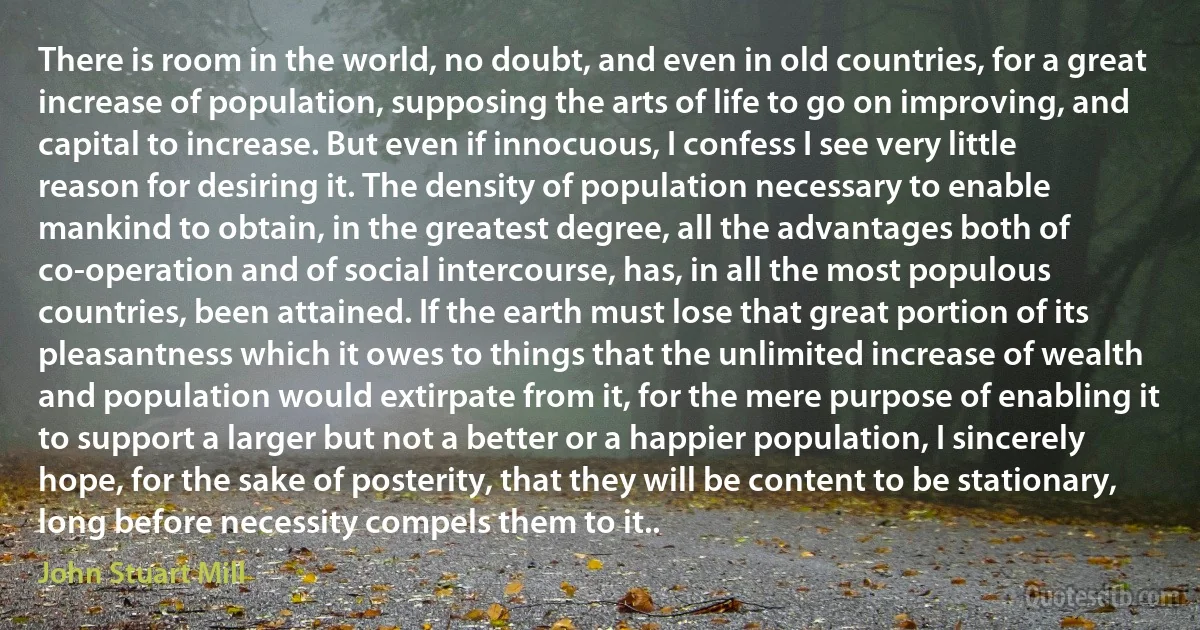
There is room in the world, no doubt, and even in old countries, for a great increase of population, supposing the arts of life to go on improving, and capital to increase. But even if innocuous, I confess I see very little reason for desiring it. The density of population necessary to enable mankind to obtain, in the greatest degree, all the advantages both of co-operation and of social intercourse, has, in all the most populous countries, been attained. If the earth must lose that great portion of its pleasantness which it owes to things that the unlimited increase of wealth and population would extirpate from it, for the mere purpose of enabling it to support a larger but not a better or a happier population, I sincerely hope, for the sake of posterity, that they will be content to be stationary, long before necessity compels them to it..
John Stuart MillRelated topics
content degree density doubt earth enabling great happy hope increase intercourse life lose mere necessary necessity pleasantness purpose reason room sake see stationary support wealth world things co-operation owesRelated quotes
The third and intermediate kind of instruction, which connects the first two... relates to the application of scientific principles to practical purposes. It qualifies the student to plan a structure or a machine for a given purpose, without the necessity of copying some existing example, and to adapt his designs to situations to which no existing example affords a parallel. It enables him to compute the theoretical limit of the strength or stability of a structure, or the efficiency of a machine of a particular kind-to ascertain how far an actual structure or machine fails to attain that limit-to discover the cause of such shortcomings-and to devise improvements for obviating such causes; and it enables him to judge how far an established practical rule is founded on reason, how far on mere custom, and how far on error.

William John Macquorn Rankine
I told him how we kept fewer forms between us and God; retaining, indeed, no more than, perhaps, the nature of mankind in the mass rendered necessary for due observance. I told him I could not look on flowers and tinsel, on wax- lights and embroidery, at such times and under such circumstances as should be devoted to lifting the secret vision to Him whose home is Infinity, and His being - Eternity. That when I thought of sin and sorrow, of earthly corruption, mortal depravity, weighty temporal woe - I could not care for chanting priests or mumming officials; that when the pains of existence and the terrors of dissolution pressed before me - when the mighty hope and measureless doubt of the future arose in view - _then_, even the scientific strain, or the prayer in a language learned and dead, harassed: with hindrance a heart which only longed to cry - "God be merciful to me, a sinner!"

Charlotte Brontë
A severe morality holds that intercourse (and may hold this of eating, too) has something wrong about it if it is ever done except explicitly as being required for that preservation of human life which is what makes intercourse a good kind of action. But this involves thoroughly faulty moral psychology. God gave us our physical appetite, and its arousal without our calculation is part of the working of our sort of life. Given moderation and right circumstances, acts prompted by inclination can be taken in a general way to accomplish what makes them good in kind and there's no need for them to be individually necessary or useful for the end that makes them good kinds of action. Intercourse is a normal part of married life through the whole life of the partners in a marriage and is normally engaged in without any distinct purpose other than to have it, just as such a part of married life.

G. E. M. Anscombe
The American model – democracy – must be regarded as a historical error, economically as well as morally. Democracy promotes shortsightedness, capital waste, irresponsibility, and moral relativism. It leads to permanent compulsory income and wealth redistribution and legal uncertainty. It is counterproductive. It promotes demagoguery and egalitarianism. It is aggressive and potentially totalitarian internally, vis-à-vis its own population, as well as externally. In sum, it leads to a dramatic growth of state power, as manifested by the amount of parasitically – by means of taxation and expropriation – appropriated government income and wealth in relation to the amount of productively – through market exchange – acquired private income and wealth, and by the range and invasiveness of state legislation. Democracy is doomed to collapse, just as Soviet communism was doomed to collapse.

Hans-Hermann Hoppe
Labor is a commodity, like any other, and its price is therefore determined by exactly the same laws that apply to other commodities. In a regime of big industry or of free competition – as we shall see, the two come to the same thing – the price of a commodity is, on the average, always equal to its cost of production. Hence, the price of labor is also equal to the cost of production of labor. But, the costs of production of labor consist of precisely the quantity of means of subsistence necessary to enable the worker to continue working, and to prevent the working class from dying out. The worker will therefore get no more for his labor than is necessary for this purpose; the price of labor, or the wage, will, in other words, be the lowest, the minimum, required for the maintenance of life.

Friedrich Engels
